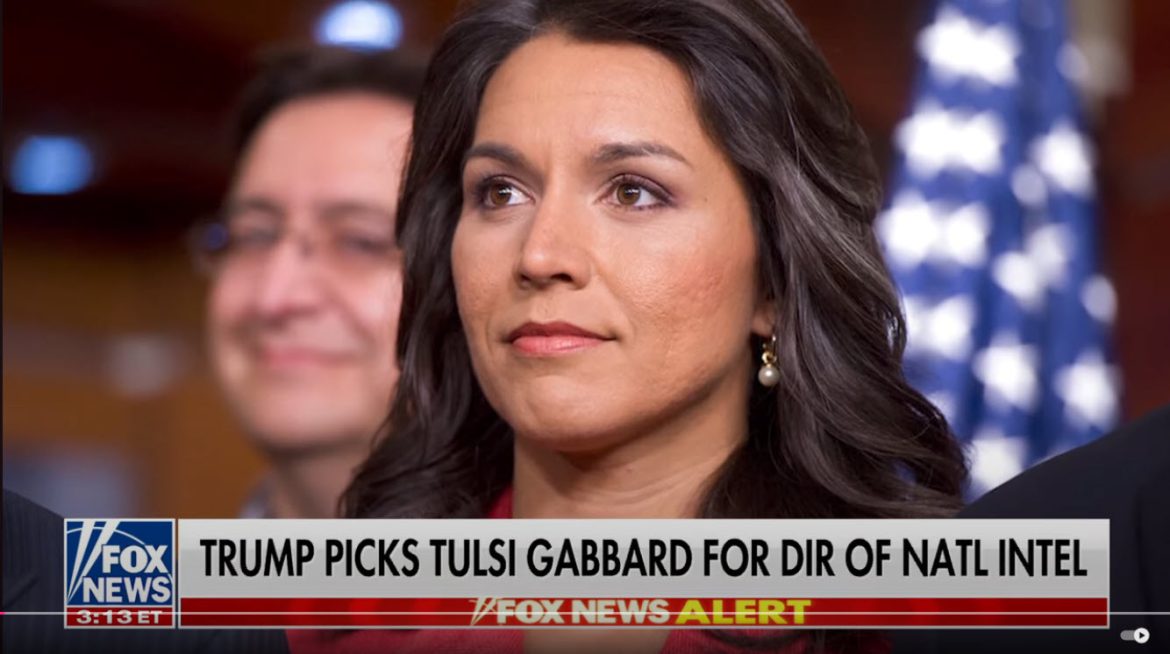President-elect Donald Trump has named former Hawaii congresswoman Tulsi Gabbard as his pick for Director of National Intelligence (DNI), a selection that has generated both bipartisan praise and criticism. In his announcement on Wednesday, Trump praised Gabbard as a long-time advocate for U.S. interests and freedoms, noting her military experience and unique political background. Trump emphasized that Gabbard, who once ran for the Democratic presidential nomination before later joining the Republican Party, is well-positioned to bring a fresh perspective to the nation’s intelligence community.
“Tulsi has fought tirelessly for our country, both in uniform and in Congress. Her dedication to freedom and her independent approach to leadership make her the perfect fit for Director of National Intelligence,” Trump said in a statement. He added that Gabbard’s background as a bipartisan figure would bring much-needed balance and a pragmatic approach to the Office of the Director of National Intelligence (ODNI).
Gabbard, who represented Hawaii’s 2nd congressional district from 2013 to 2021, has garnered support from across the political spectrum due to her advocacy on foreign policy issues and military service as an Army National Guard veteran. Gabbard served two tours in the Middle East, and her military experience has been central to her political identity. Known for her non-interventionist stance, Gabbard has often criticized both Democratic and Republican leaders for what she views as excessive U.S. military involvement abroad.
In her statement accepting the nomination, Gabbard expressed gratitude to Trump and reiterated her commitment to safeguarding national security while supporting a more restrained U.S. foreign policy. “I am honored to serve our nation in this role and look forward to working with our intelligence community to ensure we are strong, secure, and wise in our approach to the complex challenges we face,” Gabbard stated. She also underscored her intention to prioritize accountability and transparency within the intelligence community, saying that American citizens “deserve an intelligence apparatus that they can trust.”
Gabbard’s appointment is part of a broader reshaping of Trump’s national security team, which includes the nomination of Florida Senator Marco Rubio as Secretary of State. Rubio, a long-standing foreign policy hawk, contrasts with Gabbard’s non-interventionist views, leading some analysts to predict an intriguing dynamic between the two. While Rubio has been vocal about aggressive stances toward China and Iran, Gabbard has called for more diplomatic and cautious engagement.
Political reactions to Gabbard’s nomination have been mixed. Some Republicans, particularly those aligned with Trump’s “America First” approach, have praised her as a maverick who can challenge traditional intelligence paradigms. Senator Rand Paul, a known supporter of non-interventionism, voiced his approval, stating that Gabbard’s “pragmatic perspective on foreign policy is exactly what we need in intelligence leadership.” Similarly, several Democrats have acknowledged Gabbard’s bipartisan appeal, though they have reservations about her alignment with Trump’s administration.
Critics of Gabbard’s nomination, however, question her suitability for the intelligence role given her previous critiques of U.S. foreign policy and her sometimes controversial stances on global affairs. Some within the intelligence community are concerned that her non-interventionist views may hinder critical intelligence operations. Furthermore, Gabbard’s interactions with foreign leaders like Syria’s Bashar al-Assad have raised questions among national security experts. Former DNI James Clapper commented that while Gabbard brings a fresh perspective, the role demands deep familiarity with intelligence operations and potential threats. “The DNI’s role is more than foreign policy,” Clapper noted. “It’s about aligning intelligence resources and strategy with the protection of our nation’s interests.”
In contrast, Trump’s inner circle and several close advisors believe that Gabbard’s background as a former Democrat could help bridge ideological divides within the intelligence community. Gabbard’s supporters argue that her bipartisan credibility will strengthen the DNI’s connection with Congress, where she still has allies on both sides of the aisle. Her independent political stance is seen as an asset in navigating the often-partisan landscape of national intelligence oversight.
The nomination of Gabbard and other high-profile figures signals Trump’s intention to build a team that combines loyalty with fresh thinking. Analysts expect Gabbard’s approach to reflect a balance of intelligence reform and cooperation with allied nations, while resisting escalation in global conflicts. Her role in coordinating national intelligence efforts could be pivotal in addressing issues such as cybersecurity, counterterrorism, and misinformation.
As Gabbard prepares for confirmation hearings, her appointment is expected to face rigorous questioning from lawmakers, particularly on how she plans to reconcile her non-interventionist views with the demands of intelligence leadership. Observers are watching closely to see if Gabbard’s unique political path and perspectives will help reshape the intelligence community in ways that align with Trump’s broader goals.



